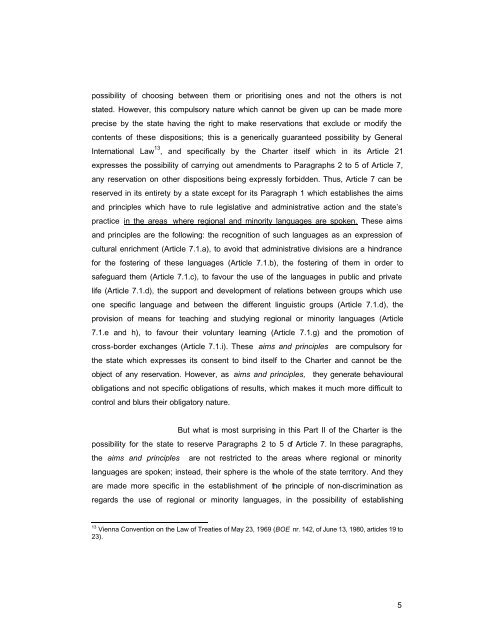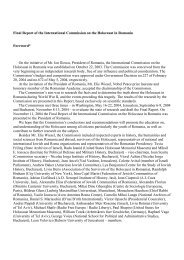get PDF document - MIRIS
get PDF document - MIRIS
get PDF document - MIRIS
Create successful ePaper yourself
Turn your PDF publications into a flip-book with our unique Google optimized e-Paper software.
possibility of choosing between them or prioritising ones and not the others is not<br />
stated. However, this compulsory nature which cannot be given up can be made more<br />
precise by the state having the right to make reservations that exclude or modify the<br />
contents of these dispositions; this is a generically guaranteed possibility by General<br />
International Law 13 , and specifically by the Charter itself which in its Article 21<br />
expresses the possibility of carrying out amendments to Paragraphs 2 to 5 of Article 7,<br />
any reservation on other dispositions being expressly forbidden. Thus, Article 7 can be<br />
reserved in its entirety by a state except for its Paragraph 1 which establishes the aims<br />
and principles which have to rule legislative and administrative action and the state’s<br />
practice in the areas where regional and minority languages are spoken. These aims<br />
and principles are the following: the recognition of such languages as an expression of<br />
cultural enrichment (Article 7.1.a), to avoid that administrative divisions are a hindrance<br />
for the fostering of these languages (Article 7.1.b), the fostering of them in order to<br />
safeguard them (Article 7.1.c), to favour the use of the languages in public and private<br />
life (Article 7.1.d), the support and development of relations between groups which use<br />
one specific language and between the different linguistic groups (Article 7.1.d), the<br />
provision of means for teaching and studying regional or minority languages (Article<br />
7.1.e and h), to favour their voluntary learning (Article 7.1.g) and the promotion of<br />
cross-border exchanges (Article 7.1.i). These aims and principles are compulsory for<br />
the state which expresses its consent to bind itself to the Charter and cannot be the<br />
object of any reservation. However, as aims and principles, they generate behavioural<br />
obligations and not specific obligations of results, which makes it much more difficult to<br />
control and blurs their obligatory nature.<br />
But what is most surprising in this Part II of the Charter is the<br />
possibility for the state to reserve Paragraphs 2 to 5 of Article 7. In these paragraphs,<br />
the aims and principles are not restricted to the areas where regional or minority<br />
languages are spoken; instead, their sphere is the whole of the state territory. And they<br />
are made more specific in the establishment of the principle of non-discrimination as<br />
regards the use of regional or minority languages, in the possibility of establishing<br />
13 Vienna Convention on the Law of Treaties of May 23, 1969 (BOE nr. 142, of June 13, 1980, articles 19 to<br />
23).<br />
5












